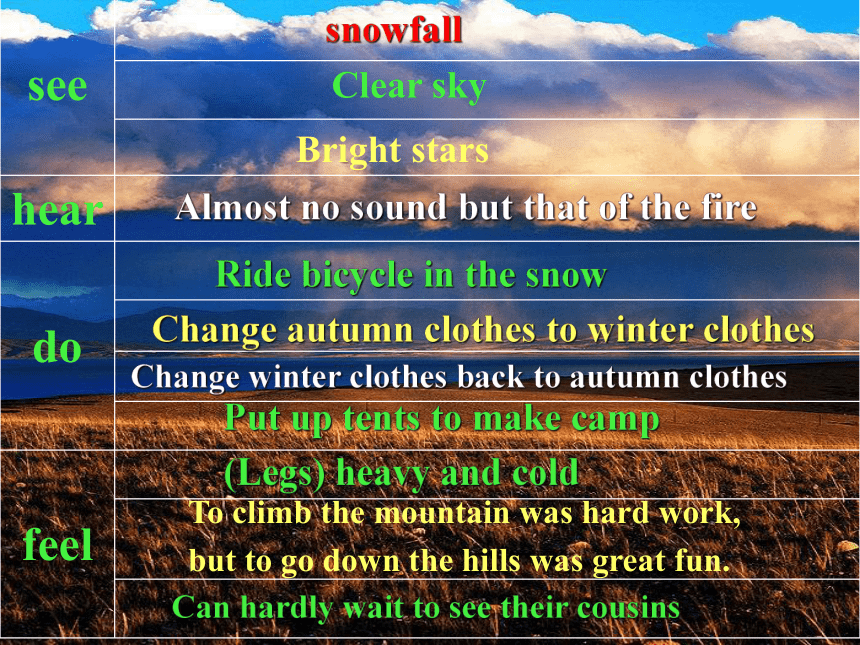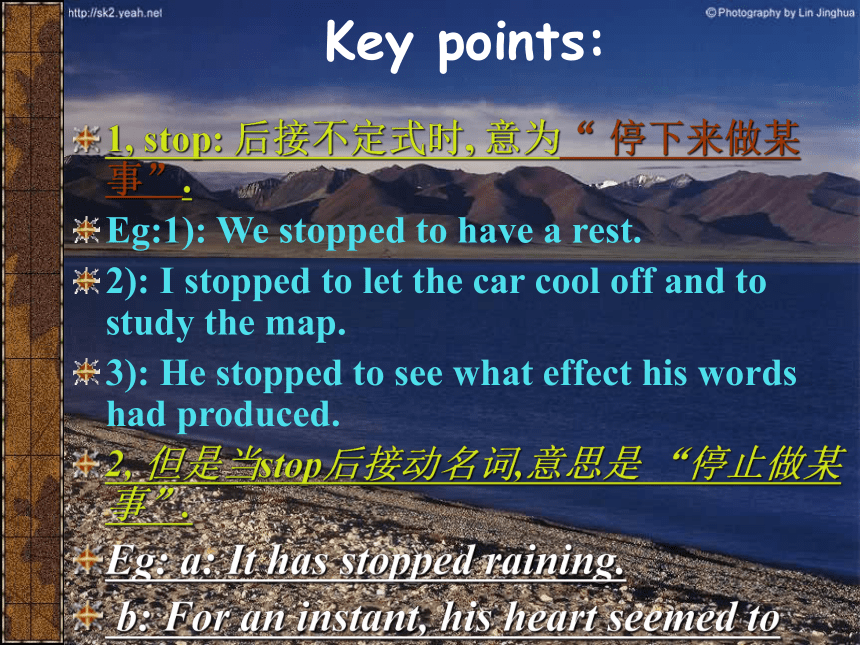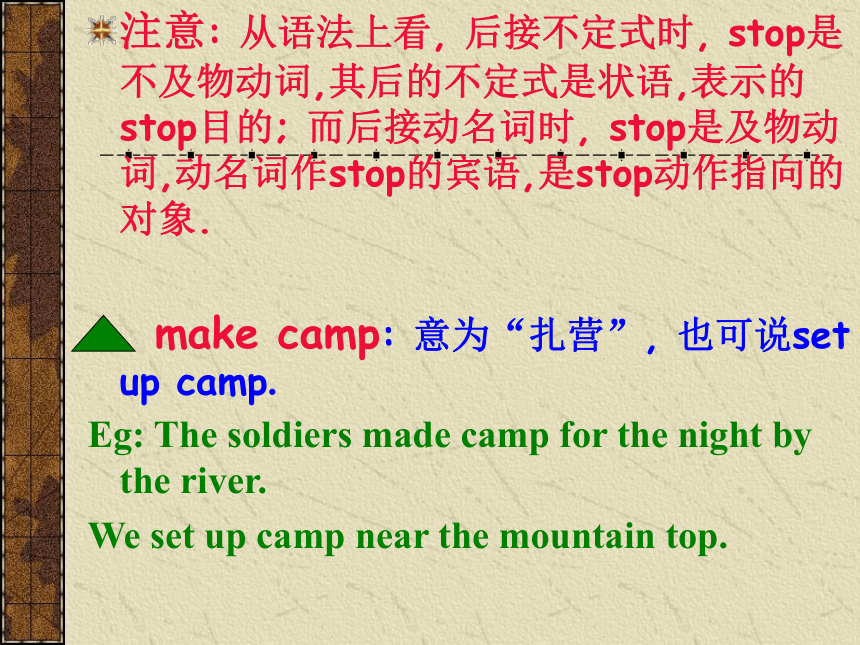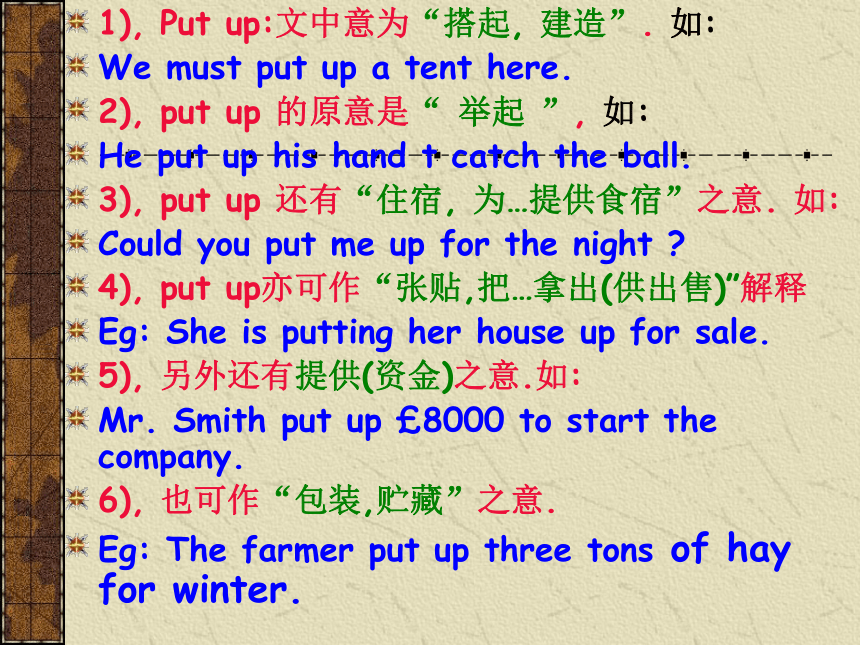Unit3 A night in the mountains[上学期]
文档属性
| 名称 | Unit3 A night in the mountains[上学期] |

|
|
| 格式 | rar | ||
| 文件大小 | 528.2KB | ||
| 资源类型 | 教案 | ||
| 版本资源 | 通用版 | ||
| 科目 | 英语 | ||
| 更新时间 | 2007-01-19 00:00:00 | ||
图片预览







文档简介
课件15张PPT。Journey down the Mekong
Part 2 : A night in the mountains
The Tibetan MountainsQuestions:1, How des Wang Kung feel about the trip now?
2, What do you think has changed his attitude?
3, What are the different experiences ?snowfallClear skyBright starsAlmost no sound but that of the fireRide bicycle in the snowChange autumn clothes to winter clothesChange winter clothes back to autumn clothesPut up tents to make camp(Legs) heavy and coldTo climb the mountain was hard work,
but to go down the hills was great fun.Can hardly wait to see their cousinsKey points:1, stop: 后接不定式时, 意为“ 停下来做某事”.
Eg:1): We stopped to have a rest.
2): I stopped to let the car cool off and to study the map.
3): He stopped to see what effect his words had produced.
2, 但是当stop后接动名词,意思是 “停止做某事”.
Eg: a: It has stopped raining.
b: For an instant, his heart seemed to stop beating.
注意: 从语法上看, 后接不定式时, stop是不及物动词,其后的不定式是状语,表示的stop目的; 而后接动名词时, stop是及物动词,动名词作stop的宾语,是stop动作指向的对象.
make camp: 意为“扎营”, 也可说set up camp.
Eg: The soldiers made camp for the night by the river.
We set up camp near the mountain top.
1), Put up:文中意为“搭起, 建造”. 如:
We must put up a tent here.
2), put up 的原意是“ 举起 ”, 如:
He put up his hand t catch the ball.
3), put up 还有“住宿, 为…提供食宿”之意. 如:
Could you put me up for the night ?
4), put up亦可作“张贴,把…拿出(供出售)”解释
Eg: She is putting her house up for sale.
5), 另外还有提供(资金)之意.如:
Mr. Smith put up £8000 to start the company.
6), 也可作“包装,贮藏”之意.
Eg: The farmer put up three tons of hay for winter.Put up , set up Put up 与 set up 都有“ 建立 ” “竖立”“支起”之意, 意思相同,但有“建立”或“成立”一个组织,一个委员会或基金会等,而所表示的“建造”仅 指物质的东西,不涉及“组织”之类.如:
A special committee has been set up to examine the details of the suggestion.
We are going to set up four study groups in our class.
Awake: 文中是形容词,意为醒着,是表语形容词,不能作前置定语,而只能作表语或宾语补足语.
Eg: Is he asleep or awake ?
注意, awake形容词不能用very修饰,而要说wide awake, fully awake.
Eg:He was wide awake when he reached the village.
注:与awake用法类似的表语形容词有:alive, alone, alike 等以a开头,但重读在第二个音节上的词.
Eg: Let’s keep the fish alive.
Awake也可以作动词用,意为唤醒,唤起.
Eg: The noise awoke me from my sleep.
Awake 也可作不及物动词, 意为醒来,觉醒.
Eg: When she awoke, it was broad daylight.
当awake可引申为察觉,意识到时, 后常接介词to .
Eg: They at last awoke to the danger.
Quiet, 主要是指静止的,宁静的,指没有骚乱的一种状态,其反义词是noisy.
Eg: Then she heard the quiet footsteps.
He lives in a quiet street.
可表示人性情温和, 不易激动或不爱活动,意为“文静的”,
Eg: My parents are quiet people. They never go out in the evening.
注意: 与quiet意思相近的还有calm, silent, still, 但词义的侧重点有所不同.calm主要强调人的心境的安详,冷静, 不激动,在表示天气时指风平浪静的,无风的.
Eg: The captain advised his men to keep calm.Silent的意思是“无声的, 寂静的”,与calm和quiet相比, 它侧重于无声.
Eg: The streets of cities are never silent.
比较:This is a quiet street.(指没有嘈杂声, 并非指没声音)
Students must be silent during the study-hour.
注意:silent 还有沉默的,无言的意思, 指对某件事不发表意见, 保持沉默.
Eg: Do you know when to keep silent ?
注意:还可作“没提到的, 没记载的” 解释.
History is silent about it.历史没有记载.
Still 虽也可作“寂静的, 无声的” 解释, 但它着重于“一动不动” 地保持一种姿势.
Eg: That child can’t keep still for a moment.
Join 此处意为“来(去)和(某人)在一起.” 如:
You go ahead, I’ll join you shortly.
She did not join us at play that afternoon.
join表示“参加(活动)”时, join后跟介词in.
Eg: The whole nation joined in the celebration.
注意:有时In后面可以不跟宾语.
Eg: Ann started sing and the others joined in.
Join 的原意是“参加, 加入(团体,组织)”
His son joined the army last year.
Join in和take part in 在指参加活动,会议时可互换
Eg: Did you take part in the meeting yesterday?
They often take part in outdoor activities.Put…into…意为“使进入…(状态)”
Eg: They hoped to put the plan into action.
More buses are to be put into service.
It is one thing to have theories and another thing to put them into practice.
put into还有“把…译成,用…表达”之意,
Eg: I don’t know how to put that into English.
I can’t quite put my feelings into words.
Put this sentence into other words.
Put into 有“(船)靠(码头)”之意.
Eg: The ship had to put into Sidney for supplies.Familiar是形容词, 意为“熟悉的”,可作前置定语.
Eg: I could hear Mary playing a familiar tune.
He heard the familiar voices of his friend.
Be familiar to 意为“ 为…所熟悉”
Eg: These folk tunes are familiar to the local people.
The name seems familiar to me.
Be familiar with 一般是指人熟悉某人、某物, 句子的主语是人。
Eg: I am of course familiar with your work.
Familiar 还有“过分亲密的”“放肆的”之意
He makes himself too familiar with my wife.Compare…with意为“把…同…比较”
Eg: Let’s compare the copy with the original.
注意: 有时compare …with和can连用,表示“能和…相比”
Eg: He can’t compare with Shakespeare.
compare与介词to连用时, 意为“把…比作…”
Eg: Shakespeare compared the world to a stage.
有时可以用过去分词引起状语,表示“和…比起来”,这时介词to和with都可以用.
It was a small place then compare to/with what it is now.
compare的名词是Comparison,意为“比较,对照”
Eg: There is no comparison between the two.
Agree 意为“同意,赞成”, 后接介词 with时,表示“与某人或某观点一致”, 是指出自主观愿望的“赞成,同意”.
Eg: I agree with him about the way of solving the problem.
Agree 与to连用时, 表示“同意,接受(提议,计划,条件等).
Eg: Do you agree to the proposal?
Agree on/ upon是指双方或多方“在…方面取得一致意见”或“在…方面达成非正式协议,”因此主语必须指双方或多方,或者谈及到另一方.
Eg: We agreed on a date for next meeting.
Part 2 : A night in the mountains
The Tibetan MountainsQuestions:1, How des Wang Kung feel about the trip now?
2, What do you think has changed his attitude?
3, What are the different experiences ?snowfallClear skyBright starsAlmost no sound but that of the fireRide bicycle in the snowChange autumn clothes to winter clothesChange winter clothes back to autumn clothesPut up tents to make camp(Legs) heavy and coldTo climb the mountain was hard work,
but to go down the hills was great fun.Can hardly wait to see their cousinsKey points:1, stop: 后接不定式时, 意为“ 停下来做某事”.
Eg:1): We stopped to have a rest.
2): I stopped to let the car cool off and to study the map.
3): He stopped to see what effect his words had produced.
2, 但是当stop后接动名词,意思是 “停止做某事”.
Eg: a: It has stopped raining.
b: For an instant, his heart seemed to stop beating.
注意: 从语法上看, 后接不定式时, stop是不及物动词,其后的不定式是状语,表示的stop目的; 而后接动名词时, stop是及物动词,动名词作stop的宾语,是stop动作指向的对象.
make camp: 意为“扎营”, 也可说set up camp.
Eg: The soldiers made camp for the night by the river.
We set up camp near the mountain top.
1), Put up:文中意为“搭起, 建造”. 如:
We must put up a tent here.
2), put up 的原意是“ 举起 ”, 如:
He put up his hand t catch the ball.
3), put up 还有“住宿, 为…提供食宿”之意. 如:
Could you put me up for the night ?
4), put up亦可作“张贴,把…拿出(供出售)”解释
Eg: She is putting her house up for sale.
5), 另外还有提供(资金)之意.如:
Mr. Smith put up £8000 to start the company.
6), 也可作“包装,贮藏”之意.
Eg: The farmer put up three tons of hay for winter.Put up , set up Put up 与 set up 都有“ 建立 ” “竖立”“支起”之意, 意思相同,但有“建立”或“成立”一个组织,一个委员会或基金会等,而所表示的“建造”仅 指物质的东西,不涉及“组织”之类.如:
A special committee has been set up to examine the details of the suggestion.
We are going to set up four study groups in our class.
Awake: 文中是形容词,意为醒着,是表语形容词,不能作前置定语,而只能作表语或宾语补足语.
Eg: Is he asleep or awake ?
注意, awake形容词不能用very修饰,而要说wide awake, fully awake.
Eg:He was wide awake when he reached the village.
注:与awake用法类似的表语形容词有:alive, alone, alike 等以a开头,但重读在第二个音节上的词.
Eg: Let’s keep the fish alive.
Awake也可以作动词用,意为唤醒,唤起.
Eg: The noise awoke me from my sleep.
Awake 也可作不及物动词, 意为醒来,觉醒.
Eg: When she awoke, it was broad daylight.
当awake可引申为察觉,意识到时, 后常接介词to .
Eg: They at last awoke to the danger.
Quiet, 主要是指静止的,宁静的,指没有骚乱的一种状态,其反义词是noisy.
Eg: Then she heard the quiet footsteps.
He lives in a quiet street.
可表示人性情温和, 不易激动或不爱活动,意为“文静的”,
Eg: My parents are quiet people. They never go out in the evening.
注意: 与quiet意思相近的还有calm, silent, still, 但词义的侧重点有所不同.calm主要强调人的心境的安详,冷静, 不激动,在表示天气时指风平浪静的,无风的.
Eg: The captain advised his men to keep calm.Silent的意思是“无声的, 寂静的”,与calm和quiet相比, 它侧重于无声.
Eg: The streets of cities are never silent.
比较:This is a quiet street.(指没有嘈杂声, 并非指没声音)
Students must be silent during the study-hour.
注意:silent 还有沉默的,无言的意思, 指对某件事不发表意见, 保持沉默.
Eg: Do you know when to keep silent ?
注意:还可作“没提到的, 没记载的” 解释.
History is silent about it.历史没有记载.
Still 虽也可作“寂静的, 无声的” 解释, 但它着重于“一动不动” 地保持一种姿势.
Eg: That child can’t keep still for a moment.
Join 此处意为“来(去)和(某人)在一起.” 如:
You go ahead, I’ll join you shortly.
She did not join us at play that afternoon.
join表示“参加(活动)”时, join后跟介词in.
Eg: The whole nation joined in the celebration.
注意:有时In后面可以不跟宾语.
Eg: Ann started sing and the others joined in.
Join 的原意是“参加, 加入(团体,组织)”
His son joined the army last year.
Join in和take part in 在指参加活动,会议时可互换
Eg: Did you take part in the meeting yesterday?
They often take part in outdoor activities.Put…into…意为“使进入…(状态)”
Eg: They hoped to put the plan into action.
More buses are to be put into service.
It is one thing to have theories and another thing to put them into practice.
put into还有“把…译成,用…表达”之意,
Eg: I don’t know how to put that into English.
I can’t quite put my feelings into words.
Put this sentence into other words.
Put into 有“(船)靠(码头)”之意.
Eg: The ship had to put into Sidney for supplies.Familiar是形容词, 意为“熟悉的”,可作前置定语.
Eg: I could hear Mary playing a familiar tune.
He heard the familiar voices of his friend.
Be familiar to 意为“ 为…所熟悉”
Eg: These folk tunes are familiar to the local people.
The name seems familiar to me.
Be familiar with 一般是指人熟悉某人、某物, 句子的主语是人。
Eg: I am of course familiar with your work.
Familiar 还有“过分亲密的”“放肆的”之意
He makes himself too familiar with my wife.Compare…with意为“把…同…比较”
Eg: Let’s compare the copy with the original.
注意: 有时compare …with和can连用,表示“能和…相比”
Eg: He can’t compare with Shakespeare.
compare与介词to连用时, 意为“把…比作…”
Eg: Shakespeare compared the world to a stage.
有时可以用过去分词引起状语,表示“和…比起来”,这时介词to和with都可以用.
It was a small place then compare to/with what it is now.
compare的名词是Comparison,意为“比较,对照”
Eg: There is no comparison between the two.
Agree 意为“同意,赞成”, 后接介词 with时,表示“与某人或某观点一致”, 是指出自主观愿望的“赞成,同意”.
Eg: I agree with him about the way of solving the problem.
Agree 与to连用时, 表示“同意,接受(提议,计划,条件等).
Eg: Do you agree to the proposal?
Agree on/ upon是指双方或多方“在…方面取得一致意见”或“在…方面达成非正式协议,”因此主语必须指双方或多方,或者谈及到另一方.
Eg: We agreed on a date for next meeting.
